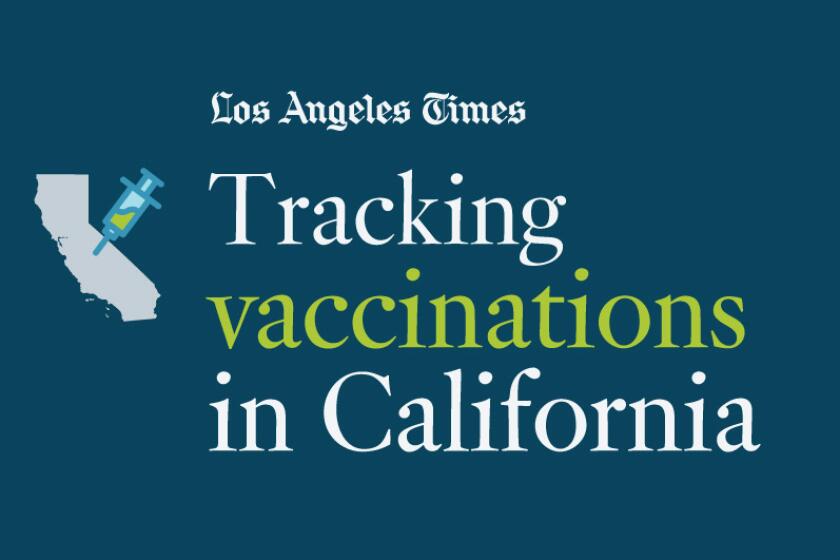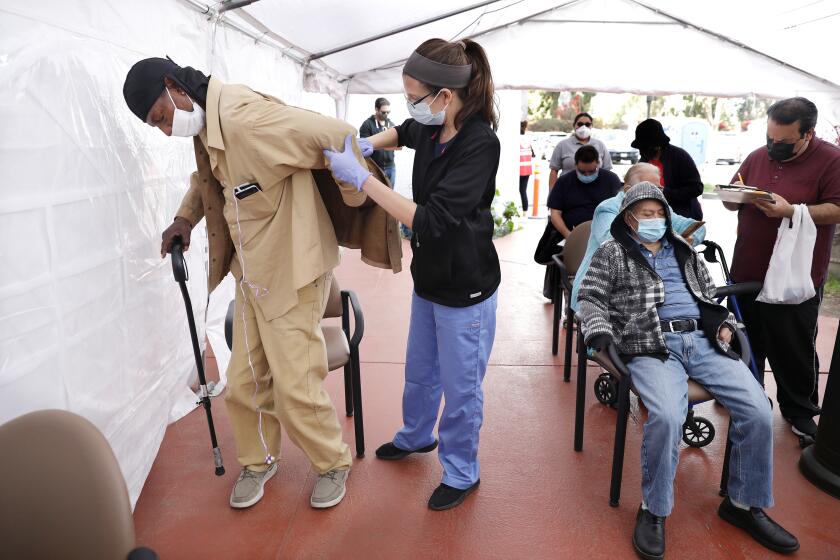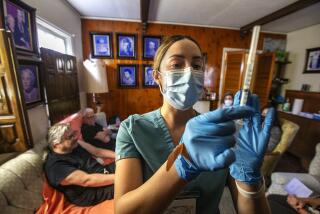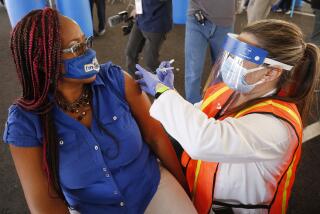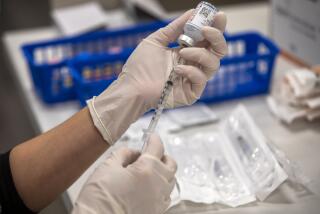California’s vaccine eligibility is expanding — if you live in the right places
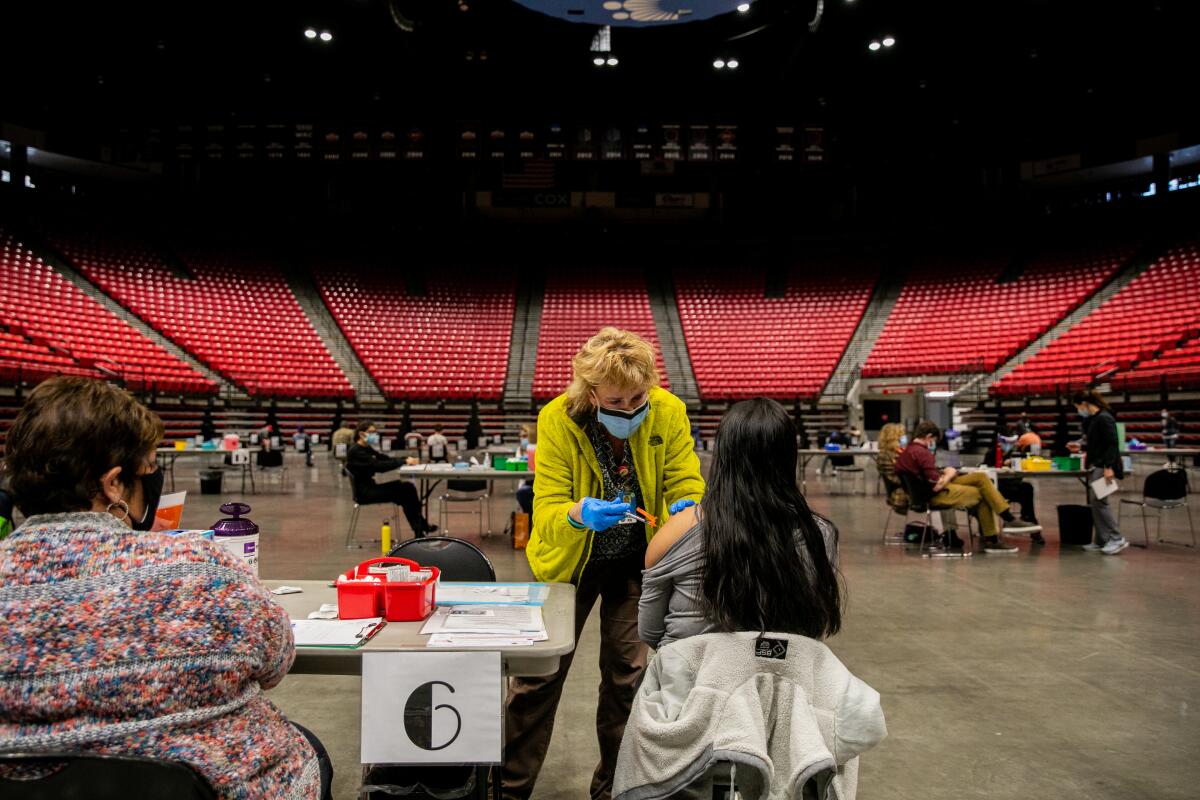
- Share via
In parts of the Bay Area, anyone who is 50 or older can get the COVID-19 vaccine right away.
In San Diego, health officials are vaccinating anyone with asthma or Type 1 diabetes.
And in San Francisco, the shot is available to anyone who is HIV positive or is considered obese.
As COVID-19 vaccine supplies increase, a growing number of California’s 61 health departments have broken with state health guidelines and made the shots available to potentially millions of additional people, sparking joy among locals, and frustration and envy from residents in counties that are sticking with stricter rules.
“Every decision the authorities have made have put me just on the outside looking in,” said Mike Zimmerman, 48, a communications worker who lives in downtown Los Angeles. Zimmerman has repeatedly found himself almost, but not quite, making the cut: A few blocks from a prioritized ZIP Code, a few years from some age cutoffs, in a job category knocked from the state’s priority list.
“My industry got cut from this list while others became eligible,” he said. “My job went from deserving a vaccine to not deserving a vaccine, despite my job being no less dangerous.”
At least four counties — including Contra Costa, San Luis Obispo, Butte and Solano — have recently lowered their age requirement for vaccination to 50. In Tuolumne, it’s 45. Several others, including San Diego and San Francisco, are now vaccinating people who are considered overweight or have some chronic health conditions.
Some counties that expanded access have seen dwindling interest in vaccines, while others have received additional doses through the state or pharmacies. Other counties, including Los Angeles, are still struggling to secure enough doses to meet demand.
Experts say about most Americans will need to be vaccinated to bring the coronavirus pandemic under control. Track California’s progress toward that goal.
Dr. Barbara Ferrer, head of L.A. County’s public health department, said Tuesday that she hopes the county will open vaccinations to everyone before May 1, the date targeted by Gov. Gavin Newsom, but much depends on supply. In the early days of open eligibility, the county should focus on vaccinating residents in neighborhoods hit hardest by COVID-19, she said.
The expanding but still patchy vaccine access has led to some confusion. People who are overweight — those with a body mass index between 25 and 29.9 — can be vaccinated in San Diego County, but not in neighboring Orange County, for instance. Residents of Contra Costa County in their 50s are now eligible, but residents in Alameda County are not.
It is up to each county whether to limit vaccines to those who live or work locally, state officials say. But some federal and retail pharmacy sites don’t have such limitations, and the temptation to cross county lines is strong.
L.A. County is continuing to follow the state’s guidance for vaccine eligibility, the health department said Tuesday. County-run sites will not vaccinate people who do not live or work in the county, and have overbooked appointments if people from other counties manage to get a slot, Ferrer said.
Gov. Gavin Newsom said California was expected to receive about 1.8 million doses this week. More than 15.1 million doses have been administered in the state, which recently broadened vaccine access to nearly 5 million people with underlying health conditions and disabilities.
The state’s standards are still more conservative than many others, including Alaska, West Virginia and Mississippi, which are vaccinating everyone ages 16 and older. Georgia, Arizona and Texas are following suit this month. Everyone who is 50 and above is eligible in Florida and New York, and Indiana and Ohio are vaccinating residents in their 40s.
Opening vaccinations to more people will add competition for eligible people who have struggled to book an appointment. That includes senior citizens with no reliable internet access, patients with language barriers and essential workers with multiple jobs and little time.
In the race to improve vaccination rates in California’s most vulnerable areas, community groups are leading the charge.
Some counties, like San Diego, said they opted to follow guidelines from the Centers for Disease Control and Prevention, which are broader than the state’s.
That county is now explicitly offering vaccines to people with a BMI over 25: about 169 pounds for a man of an average height of 5 feet 9 inches, and 145 pounds for a woman of an average height of 5 feet 4 inches. It is also vaccinating people with asthma, high blood pressure, dementia, Type 1 diabetes and other conditions that might place them at a higher risk.
It’s unclear how many people are now eligible in San Diego County since “many have crossover comorbidities and don’t line up in nice neat columns,” but the vast majority of vaccination appointments are still being claimed, Health and Human Services Agency spokeswoman Anita Lightfoot said.
More than 30% of San Diego’s residents have received a dose, compared with 26% statewide.
San Luis Obispo County on Monday expanded access to residents ages 50 to 64 — about 50,000 people — in part because additional doses sent by the federal government to retail pharmacies like CVS have relieved the pressure on county vaccination sites, spokesman Michelle Shoresman said.
“We started to see more providers getting increased and steady supplies, and more pharmacies coming online,” Shoresman said.
When California broadened vaccine access to people with severe underlying health conditions and disabilities, San Francisco health officials “interpreted this eligibility criteria more broadly” to include residents who have HIV or a BMI of 30 or higher, a health department spokesperson said.
They also prioritized people with disabilities, including mental health and substance-abuse disorders, the city said. About 10% of San Francisco’s population identifies as deaf or disabled.
Not every county is basing its expansion on steady supplies. Northern California’s Solano County has experienced a steep decline in vaccine allocation over the last two weeks, but it opened eligibility to people over 50 last week, officials said.
The decision was based in part on demand, not supply: Reservations have been slowing. “When people are being notified and the appointments aren’t being taken up, that’s when we know we’ve got to open it up,” said Jayleen Richards, the county’s public health administrator.
Some at-risk community members who have yet to be vaccinated said the most recent opening was premature. Just days after Solano expanded eligibility, Yvette Espinoza, 29, showed up for a confirmed appointment at Dunnell Nature Center and found the facility closed.
A piece of paper had fallen from the front door and landed on the ground. “No vaccine — ran out,” it said in black marker.
“I broke down,” said, Espinoza, who has several underlying health conditions. “I was seeing mothers walking with their kids in wheelchairs and people struggling to get out of their cars just to be disappointed. We really need to fix the system.”
Solano County is now urging the state to send more doses.
In Tuolomne County, officials recently expanded eligibility to residents 45 and older, in part due to vaccine hesitancy, Office of Emergency Services Coordinator Dore Bietz said. The county has received a steady allotment of vaccine for everyone who is eligible and interested in vaccination, Bietz said, and has had extra doses.
Other counties continue to complain that a limited supply is hindering their vaccination efforts. State and local officials have warned for weeks that supply would remain flat until late March or early April, when allocation is expected to increase significantly.
Last week in Santa Clara County, officials postponed second-dose appointments for thousands of Kaiser Permanente clients.
“The lack of sufficient supply from the state has been frustrating for everyone,” said Dr. Marty Fenstersheib, Testing and Vaccine Officer for Santa Clara County, “particularly those who are eligible for the vaccine, and want to be vaccinated, but have been unable to sign up.”
Times staff writer Jaclyn Cosgrove contributed to this report.
More to Read
Sign up for Essential California
The most important California stories and recommendations in your inbox every morning.
You may occasionally receive promotional content from the Los Angeles Times.
